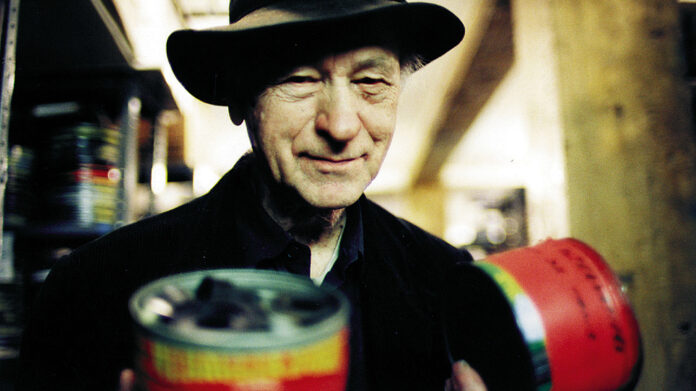The late Jonas Mekas is one of the most prominent names in the world of artistic cinema, hailed by many as the Godfather of Avant-Garde cinema. From being a hugely influential figure, he lived a phenomenal life that could be made into multiple feature length films and you’d still have chapters of his life to talk about.
Over the years, he was a keen documenter and a founding member of Anthology Film Archives, The Film-Makers’ Cooperative, and the journal Film Culture. This list will focus on his best films, or to put it better, our favourites, which are often heavily shot in the iconic home-style Mekas became known for over his remarkable career.
The Brig (1964)
In collaboration with his brother Adolfas, who edited the footage from two hours down to approximately one hour, Jonas Mekas directed this clandestine filming of a stage production by the Living Theatre, directed by Judith Malina and Julian Beck. Mekas secretly filmed the play after midnight, on the final night before the set was dismantled.
The Brig provides a highly realistic depiction of life in a Marine Corps brig, or military jail, at a camp in Japan in 1957. Adapted from a play by Kenneth H. Brown, the film portrays Marine prisoners being awakened and subjected to exhausting work details over the course of a single day, enduring severe and shocking physical and psychological degradation and abuse.
Shot entirely in one location, the film runs for 1 hour and 8 minutes and employs Mekas’s distinctive handheld camera style. The stark black-and-white palette emphasizes the bleakness of the depicted environment, immersing viewers deeply into the prisoners’ grim reality. Despite its roots in a fictional play, The Brig was awarded Best Documentary at the prestigious 1964 Venice Film Festival.
Cassis (1966)
Cassis is a four-minute short by Mekas. The film is captured with an oblique camera which is in a stationary position filming the lighthouse in Cassis, France at the entrance to its harbor. The resulting footage is displayed time-lapse, compressed into four minutes. A number of sailboats offshore appear as the camera occasionally veers away from the lighthouse and into the open water instead of the lighthouse. The footage begins just before dawn and ends just after nightfall.
A lot of the film is dedicated to showing pleasure craft coming into and out of the harbor, the relatively still ocean water, and pedestrians walking along the lighthouse pier.
Williamsburg, Brooklyn (2003)
Williamsburg, Brooklyn is a short 15-minute film by Mekas that comprises footage Mekas shot in 1950 and 1972, capturing his early experiences in New York’s Brooklyn neighborhood. It’s rather soothing and observational in some sense.
Guns of the Trees (1961)
In this feature-length drama film, Mekas focuses on depressed woman, Barbara, played by Frances Stillman. She is on the verge of suicide while a man she meets in a church and a married couple try to convince her that life is worth living. It’s not the most convincing work of Mekas, but certainly a worthy watch if you’re looking to understand his wider filmography and his earlier work. The film stars actors Ben Carruthers who appeared in The Dirty Dozen (1967).
As I Was Moving Ahead Occasionally I Saw Brief Glimpses of Beauty (2000)
Arguably one of this most recognised films, As I Was Moving Ahead Occasionally I Saw Brief Glimpses of Beauty is certainly a mouthful title-wise but also in its length documenting being nearly 5 hours long. The film documents Mekas’ personal life through a feature length narrative from over 30 years of private home movie footage. It’s a film I’d say you’ll need an intermission but it has beautiful moments of true beauty that should be appreciated by all, art-lovers, historians and the casual folk that may have never seen such a movie.
Birth of a Nation (1983)
In Birth of a Nation, Mekas leads a retrospective avant-garde, a whirlwind tour of 160 underground film people he captured on film over four decades. 160 portraits or rather appearances, sketches and glimpses of the avant-garde, independent filmmakers and film activists between 1955 and 1996.
Lost, Lost, Lost (1976)
In this nearly 3-hour film, Jonas Mekas documents his early years building a life and discovering an arts community in New York. It’s a personal favourite of mine as it captures the Lithuanian community within America, a truly important piece of cinema and art for the ages.
Reminiscences of a Journey to Lithuania (1972)
Another personal film, Reminiscences of a Journey to Lithuania is a 1972 documentary that explores Mekas’ trip back to Semeniškiai, the village of his birth in Lithuania. Through highly personal footage and voiceover, Mekas recalls this visit to the Lithuanian village of Semeniškiai, Panevėžys in 1971 after a 27-year absence.

